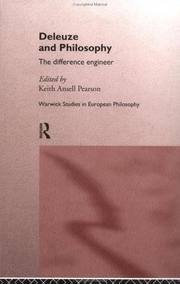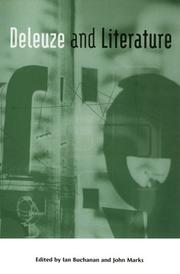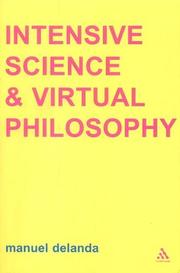| Listing 1 - 10 of 295 | << page >> |
Sort by
|

ISBN: 1134765282 1280110139 020328240X 0203002369 9780203282403 9780203002360 0415142695 9780415142694 0415142709 9780415142700 9781134765232 9781134765270 9781134765287 1134765274 Year: 2002 Publisher: London ; New York : Routledge,
Abstract | Keywords | Export | Availability | Bookmark
 Loading...
Loading...Choose an application
- Reference Manager
- EndNote
- RefWorks (Direct export to RefWorks)
The work of Gilles Deleuze has had an impact far beyond philosophy. He is among Foucault and Derrida as one of the most cited of all contemporary French thinkers. Never a student 'of' philosophy, Deleuze was always philosophical and many influential poststructuralist and postmodernist texts can be traced to his celebrated resurrection of Nietzsche against Hegel in his Nietzsche and Philosophy, from which this collection draws its title. This searching new collection considers Deleuze's relation to the philosophical tradition and beyond to the future of philosophy, science and technology. In addition to considering Deleuze's imaginative readings of classic figures such as Spinoza and Kant, the essays also point to the meaning of Deleuze on 'monstrous' and machinic thinking, on philosophy and engineering, on philosophy and biology, on modern painting and literature. Deleuze and Philosophy continues the spirit of experimentation and invention that features in Deleuze's work and will appeal to those studying across philosophy, social theory, literature and cultural studies who themselves are seeking new paradigms of thought.
Book
ISBN: 1527500489 9781527500488 Year: 2017 Publisher: Newcastle upon Tyne, England : Cambridge Scholars Publishing,
Abstract | Keywords | Export | Availability | Bookmark
 Loading...
Loading...Choose an application
- Reference Manager
- EndNote
- RefWorks (Direct export to RefWorks)
This book examines the role of art in French philosopher Gilles Deleuze's (1925-1995) late writings. Can works of art produce not only visual and spatial effects but also render ideas manifest? Can movement be treated in architecture so that it changes our relation to time? In what ways can sculpture help us to think differently, in a more open and creative way? In the last decade of his life, Deleuze wrote about these and other questions, increasingly turning to art as a model for a new way of thinking. Using examples from twentieth-century architecture, film, literature, painting and sculpture, this book follows Deleuze's engagement with art to illustrate a new image of thought. This book is of interest to architects, artists and theorists and to those wishing to learn about Deleuze's work and contemporary aesthetic practice and theory.
Book
ISBN: 2763740391 9782763740393 Year: 2018 Publisher: Paris Baltimore, Md. : Hermann Project MUSE,
Abstract | Keywords | Export | Availability | Bookmark
 Loading...
Loading...Choose an application
- Reference Manager
- EndNote
- RefWorks (Direct export to RefWorks)
Par-delà les effets de mode et les motifs politiques qui ont pu aider ou nuire à sa réception, l’œuvre de Gilles Deleuze semble plus que jamais mobilisée et retravaillée dans des domaines étonnamment divers de la pensée contemporaine. Notre ouvrage s’inscrit dans ce contexte vivant par une série d’études et de dialogues critiques centrés sur trois aspects fondamentaux : les propositions deleuziennes pour une philosophie de la nature, ses propositions sur le statut et le propre de la pensée et, enfin, les horizons politiques d’une œuvre protéiforme. Trois aspects par lesquels cet esprit classique qu’était aussi Deleuze retrouvait peu ou prou la tripartition stoïcienne de la philosophie. Mais trois aspects désormais traversés par une même intuition et une même visée : l’élaboration systématique de cette pensée de la différence qui hante notre époque.

ISBN: 1474465471 0585443122 0748612076 9780748612079 Year: 2000 Publisher: Edinburgh Edinburgh University Press
Abstract | Keywords | Export | Availability | Bookmark
 Loading...
Loading...Choose an application
- Reference Manager
- EndNote
- RefWorks (Direct export to RefWorks)
Although he is best known as a philosopher, Deleuze's interests were extremely far reaching - in addition to his important critiques of major philosophers like Kant, Hume and Spinoza, he also wrote extensively on literature, cinema and art. Characteristically, he didn't apply philosophy to the arts, he always tried to extract philosophy from them.Deleuze wrote widely on literature, but always with an eye to extract something new and interesting, never merely to interpret. Indeed, his most notorious slogan was 'don't ask what it means? Ask how it works?' He wrote monographs on Proust, Kafka and Sacher-Masoch. He also wrote essays on Beckett, Melville, Jarry, T.E. Lawrence, D.H. Lawrence, and Whitman.The essays collected in this volume are the first devoted solely to Deleuze's work on literature. Written by leading Deleuzian scholars the essays focus on two main questions: how does Deleuze read literary texts? And how can we read texts in a Deleuzian way?Contributors: Bruce Baugh, Ian Buchanan, Claire Colebrook, Andre Pierre Colombat, Tom Conley, Hugh Crawford, Marlene Goldman, Eugene W. Holland, Greg Lambert, John Marks, Timothy S. Murphy and Kenneth Surin.
Literature --- Philosophy. --- Deleuze, Gilles, --- Philosophy --- Deleuze (gilles) --- Deleuze, Gilles

ISBN: 0826456235 Year: 2002 Publisher: London Continuum
Abstract | Keywords | Export | Availability | Bookmark
 Loading...
Loading...Choose an application
- Reference Manager
- EndNote
- RefWorks (Direct export to RefWorks)
Science --- Philosophy --- Deleuze, Gilles,
Book
ISBN: 0228007003 0228006996 9780228006992 9780228007005 Year: 2021 Publisher: Montreal : McGill-Queen's University Press,
Abstract | Keywords | Export | Availability | Bookmark
 Loading...
Loading...Choose an application
- Reference Manager
- EndNote
- RefWorks (Direct export to RefWorks)
"Alongside the major narratives of ethics in the tradition of Western philosophy, a reader with an eye to the vague and the peripheral, to the turbulent and shifting, will uncover minor lines of thinking--and with them, new histories and thus new futures. Minor Ethics develops a new approach to reading texts from the history of philosophical ethics. It aims to enliven lines of thought that are latent and suppressed within the major ethical texts regularly studied and taught, and to include texts and ideas that have been excluded from the canon of Western ethics. The editors and contributors have put Gilles Deleuze's concepts--such as affect, assemblage, and multiplicity--into conversation with a range of ethical texts from ancient thought to the present. Rather than aiming for a coherent whole to emerge from these threads, the essays maintain a vigilant alertness to difference, to vibrations and resonances that are activated in the coupling of texts. What emerges are new questions, new problems, and new trajectories for thinking, which have as a goal the liberation of ethical questioning. Minor Ethics takes up a range of canonical ethical questions and thinks through concrete ethical problems relating to drug addiction, environmental responsibility, xenophobia, trauma, refugees, political parties, and cultural difference. The responses to these concerns demonstrate the minoritarian promise of the opening up of ethical thinking."--
Book
ISBN: 1474490492 1399509632 1474490484 1474490468 1474490476 Year: 2021 Publisher: Edinburgh : Edinburgh University Press,
Abstract | Keywords | Export | Availability | Bookmark
 Loading...
Loading...Choose an application
- Reference Manager
- EndNote
- RefWorks (Direct export to RefWorks)
Antonia Pont shows us how to identify when practising is happening and explains, using the early philosophy of Gilles Deleuze, how it fosters transformation, and gives us access to deep memory and rest, while also cultivating stability and responsiveness in the present. Practising, in other words, gives us three kinds of time instead of one. Practising involves an interweaving of differences expressing themselves among intentional repetitions. By engaging in practising, we open times other than our habitual presents, we slip the binds of identity and we thin out our relation with behaviours that shut out the future. Whether you practise already, are curious about embarking, or are a reader of Deleuze, this book - for makers, thinkers, lovers and activists - is a rigorous account of why practising is hard to say, why it works and why it matters.
Book
ISBN: 9462702543 Year: 2021 Publisher: Leuven : Leuven University Press,
Abstract | Keywords | Export | Availability | Bookmark
 Loading...
Loading...Choose an application
- Reference Manager
- EndNote
- RefWorks (Direct export to RefWorks)
The concept of assemblage has emerged in recent decades as a central tool for describing, analysing, and transforming dynamic systems in a variety of disciplines. Coined by Deleuze and Guattari in relation to different fields of knowledge, human practices, and nonhuman arrangements, "assemblage" is variously applied today in the arts, philosophy, and human and social sciences, forming links not only between disciplines but also between critical thought and artistic practice. 'Machinic Assemblages' focuses on the concept?s uses, transpositions, and appropriations in the arts, bringing together the voices of artists and philosophers that have been working on and with this topic for many years with those of emerging scholar-practitioners. The volume embraces exciting new and reconceived artistic practices that discuss and challenge existing assemblages, propose new practices within given assemblages, and seek to invent totally unprecedented assemblages.
Book
ISBN: 1474447805 Year: 2019 Publisher: Edinburgh : Edinburgh University Press,
Abstract | Keywords | Export | Availability | Bookmark
 Loading...
Loading...Choose an application
- Reference Manager
- EndNote
- RefWorks (Direct export to RefWorks)
Repositions Deleuze as a forerunner to Speculative RealismAgainst Continuity is the first book to demonstrate that the beating heart of Gilles Deleuze’s philosophy is a systematic ontology of irreducible, singular entities. This requires a radical break with decades of Deleuzian orthodoxy, according to which Deleuze’s metaphysics revolves around the dissolution of discrete entities into a continuous world of flows and events.With reference to all of Deleuze’s work, including published and untranslated seminars, as well as the recently published Lettres et autres textes, Arjen Kleinherenbrink critically compares Deleuze’s ontology to seven related contemporary thinkers: Levi Bryant, Maurizio Ferraris, Markus Gabriel, Manuel DeLanda, Graham Harman, Tristan Garcia and Bruno Latour. These comparisons establish Deleuze as an important precursor to object-oriented speculative realism and open up exciting new avenues of thought for critics and supporters of Deleuze alike.Key FeaturesRadically repositions Deleuze as an early speculative realistExamines the similarities and differences between Deleuze and speculative realists including Levi Bryant, Manuel DeLanda, Graham Harman, Maurizio Ferraris, Tristan Garcia, Markus Gabriel and Bruno LatourConsiders all of Deleuze’s published writings, including his seminars"
Book
ISBN: 1350004405 1350004413 1350004375 9781350004405 9781350004382 1350004383 9781350004412 9781350004375 Year: 2017 Publisher: London : Bloomsbury Academic,
Abstract | Keywords | Export | Availability | Bookmark
 Loading...
Loading...Choose an application
- Reference Manager
- EndNote
- RefWorks (Direct export to RefWorks)
"Does a philosopher have an 'identity'? What kind of 'identity' is mobilized when the work of a philosopher becomes a major reference for certain schools of thought, as in the case of Gilles Deleuze and postcolonial theory? Have the promoters of a generalized Deleuzeanism taken care their usage of his specialized work does him justice? Few exponents of postcolonial and subaltern theories now dispute the influence that Deleuze's work exerted on the intellectuals and theorists who developed those theories. However, this book contends that postcolonial and subaltern theorists have engaged with Deleuzean thought in ways that have perhaps produced a long series of misunderstandings -- for which Deleuze himself is not responsible. By engaging with recent innovations in North African culture and by examining the dissemination of Deleuze's identities across a broad range of postcolonial theory, Réda Bensmaïa shows that the 'encounter' between Deleuze and the postcolonial movement can only be understood through the idea of a 'transcendental' field, in which Deleuze and his postcolonial followers find themselves captured."--Bloomsbury Publishing.
| Listing 1 - 10 of 295 | << page >> |
Sort by
|

 Search
Search Feedback
Feedback About UniCat
About UniCat  Help
Help News
News